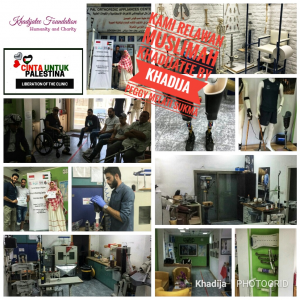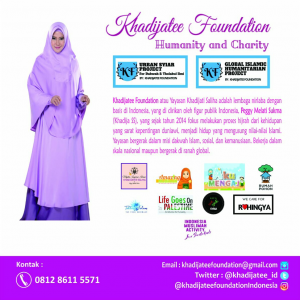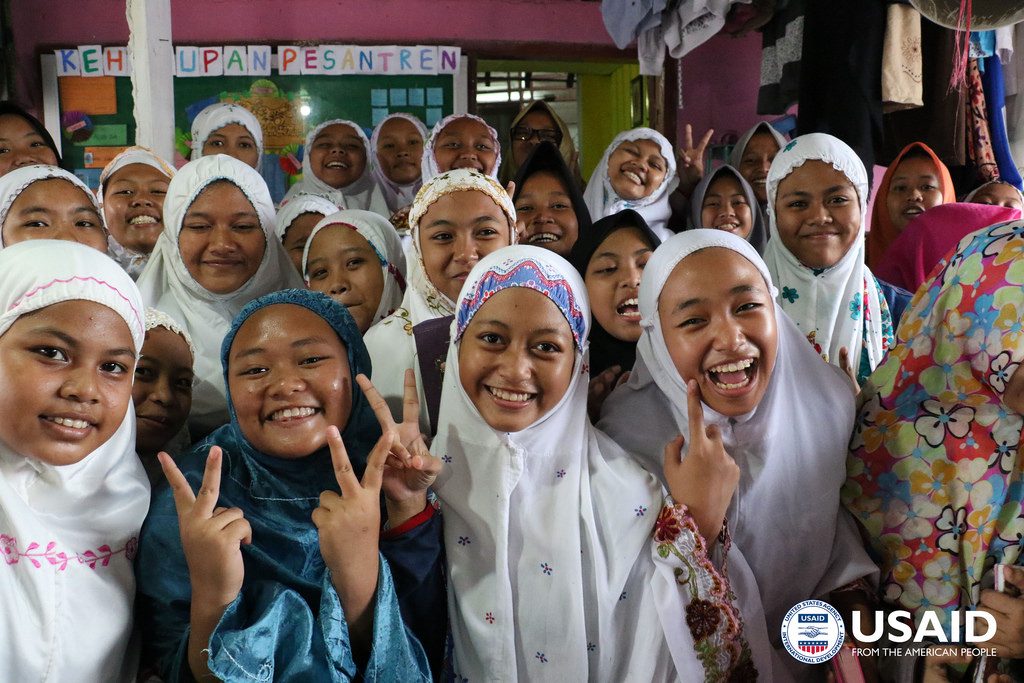Charity Networks Series – A Note from the Editorial Team
In our final essay of the Charity Networks series, Eva Nisa discusses Muslim philanthropy where women are often portrayed chiefly as the beneficiaries and not as the principal agents of philanthropic activities. Yet, throughout much of Islamic history, a number of Muslim women have contributed to diverse philanthropic sectors. This article focuses on one of Indonesia’s most important Indonesian female philanthropists, who has been prominent in the flow of charitable assistance — in this case, not from the Middle East to Southeast Asia but in the opposite direction. It demonstrates the vital role of women not only as benefactors and volunteers but also as the leaders and initiators of diverse transnational philanthropic activities.
By Eva Nisa
INTRODUCTION
Studies on philanthropy often neglect the role of women.[1] Yet, in studies of poverty, women are often mentioned as the most vulnerable parties and the ones who have to carry the greatest burden of poverty.[2] During the early days of Islam and the early modern period, women were, in fact, prominent in philanthropic activities.[3] Later, however, women were prominent mainly in their capacities as beneficiaries of philanthropy or the objects of the sympathy of philanthropists, not as “ladies bountiful”.[4]
In philanthropic work, the widespread assumption is that Gulf-based charities have been the most active in helping poor Muslim countries.[5] Indonesia has often been mentioned as one of the country beneficiaries of Gulf-based charities, such as the Saudi-based International Islamic Relief Organization (Hai’ah al-Ighasa al-Islamiyya al-‘Alamiyya)[6], al-Haramain Islamic Foundation (Mu’assasat al-Haramain al-Khayriyya),[7] and the Qatar Authority for Charitable Activities.[8] Since the explosion of oil prices in the 1970s, the flow of money from the Gulf countries through their aid organisations has been geared particularly towards supporting da‘wa (proselytisation) in Indonesia. The bulk of the aid from Middle Eastern donors has been directed towards the establishment of mosques. Charitable assistance from these donors is usually bound with the donor’s agenda and ideology. The heads of numerous pesantren (Islamic boarding schools in Indonesia) who receive donors from Gulf charities have noted that in allocating charitable assistance for the building of mosques these donors have been motivated by transcendental values, especially relating to the belief of securing a place in heaven in the afterlife.[9] In this regard, channelling funds for women’s empowerment can be difficult because it would go against the ideal image of Muslim women held by these donors.
The question thus arises whether helping women features at all in the agendas of Gulf-based charities. In fact, aid targeted at women, is not totally absent. However, it is usually lumped under the rubric of “family”. For example, Qatar Charity Indonesia, which can be regarded as the only Gulf charity that is publicly visible in Indonesia to date,[10] has a special programme for women and their families under the rubrics “Childcare, Women and Family” and “Livelihood”. This positioning reminds us of the most often debated position of women in general — that their social roles are related to their physiological functions, which consequently situates them primarily in the domestic/family domain.[11] The allocation of charitable funds for women is often directed toward their capacity as managers of domestic matters.
The lack of focus among Gulf-based charities on women’s empowerment and gender issues in Indonesia does not mean that in the links between charities in the Middle East and Southeast Asia issues concerning women and their roles are limited, or, worse, non-existent. This article focuses on the synergies built by one of the most important Indonesian female philanthropy figures in the flow of charitable assistance. This flow, notably, is not from the Middle East to Southeast Asia but in the opposite direction.
FROM INDONESIA TO PALESTINE AND SYRIA: PIETY, HUMANITY AND MATERIALISM
In the flow of charitable assistance from Southeast Asia, specifically Indonesia, to the Middle East, Peggy Melati Sukma, also known as Khadija, is the chief female figure. Peggy is a 42-year-old businesswoman, philanthropist, and actress who rose to fame in the mid-1990s and 2000s. Subsequently, in 2012, she decided to become a devout Muslim by performing the hijrah (literally emigration, or transformation, referring to the journey to become a more pious Muslim). Even before this transformation, Peggy had been known as a humanitarian activist devoted to issues affecting women and children. In 2006, the Indonesian state minister for Women’s Empowerment appointed Peggy as the Indonesian representative to the United Nations for discussing laws on women’s protection.
Peggy had initially founded three humanitarian foundations and four companies. However, after her hijrah, she pledged to dedicate herself to God by helping Muslims and dissolved these foundations and companies as she believed they ran against Islamic norms. Cognisant of the fact that humanitarian activities needed significant public support in the form of funding, Peggy decided to build strong relationships with two leading philanthropic agencies in Indonesia which she believed were trustworthy and Shari‘ah compliant institutions.[12] These are Dompet Dhuafa (Purse of the Poor; DD for short), a philanthropic agency founded in 1993 by journalists of the national Islamic daily Republika, and Aksi Cepat Tanggap (Quick Response Action; ACT for short), which was DD’s division focusing on disaster relief until it became an independent entity in 2005. Both these organisations collect funds almost entirely from Indonesian donors. The success of DD and ACT is comparable to the success of the Islamic charitable foundations in Egypt, Jordan, and Yemen studied by Janine Clark[13] and the more recent work of Mona Atia on Islamic charities in Egypt.[14] These Indonesian charities are managed professionally, making them appealing for middle-class Muslims. Additionally, they have become engines of development owing to a shift of focus beyond distributing charities to empowering deprived parties.
Peggy’s role in both DD and ACT is not only as their brand ambassador or spokesperson; in all her collaborative ventures with these organisations, she has invariably been project initiator and project coordinator.[15] One of the projects that Peggy and her followers have focused on since her transformation is a collaboration in 2014 with DD to initiate a programme titled “Amazing Muslimah” (Muslim women), aimed at reducing Qur’anic illiteracy, especially among women. The programme has so far benefitted 10,000 females in 23 spots across Indonesia. Peggy and DD have also collaborated to distribute food packages to Palestinians in the West Bank, with a target of 1,000 packages per year.
Peggy has collaborated with ACT since 2014 under its special programme “Cinta untuk Dunia Islam” (“Love for the Muslim World”), which is dedicated to helping the Muslim world in general. Peggy named her collaborative project with this ACT special programme as “Akhwat Bergerak” (“Sisters Who Move”). The project is aimed at raising awareness among Muslim women and inviting them to contribute to humanitarian activities. Peggy and Akhwat Bergerak’s involvement led ACT to appoint her as their “Super Volunteer”, a title reserved for public figures who have a weighty influence in promoting philanthropic programmes in Indonesia. A close examination of the profiles of ACT’s humanitarian volunteers reveals that women constitute the backbone of their various programmes. To date, ACT is supported by more than 175,264 volunteers — 50 per cent of whom are female.[16]
In Palestine in 2014 and 2015, ACT, Peggy and her Muslimah Bergerak raised donations to help 1,000 expectant mothers by providing them health support before and after childbirth. In 2015, they successfully launched Sham Al Amal School, the only school for disabled children in Gaza. The launch event was attended by the Palestinian minister for Public Works and Housing. Independently, Peggy has also built a small factory for producing clothes and providing other job opportunities to help the widows of Palestinian fighters.

Peggy’s call for donors to support her project to build a clinic in the West Bank.
Peggy and ACT’s latest projects in the Middle East include #CelebrityForHumanity, which invites donors to support their collaboration with Pal Orthopaedic Centre in Palestine, which provides prosthetic feet and hands for the victims of ongoing conflicts in Palestine. In Syria, they have thus far distributed donations during Ramadan and livestock for the Eid al-Adha sacrifice as well as provided health services for the victims of the current conflict. All the programmes in Palestine and Syria are designed to gradually empower the recipients, especially women, children and men in their productive ages to become self-reliant in the future.

Peggy’s collaborative project to provide prosthetic limbs to injured Palestinians.
In 2017, ACT and Peggy, along with several other Indonesian institutions such as DD, Komite Nasional untuk Rakyat Palestina (National Committee for Palestinian People; KNRP for short), Wahdah Islamiyah, and Persis, went slightly beyond humanitarian work. They served as the backbone of the Aliansi Indonesia Membela Masjid Al Aqsha (The Indonesian Alliance to Defend al-Aqsa Mosque or AIMMA for short). The movement was formed to support the Palestinians after the forced closure of Al-Aqsa Mosque.
Peggy and Muslimah Bergerak’s activities are also geared towards imbuing Muslim women — not only from Indonesia but also from places such as Hong Kong, the United States, and Germany — with a zeal for humanitarian activities and motivating them to join her cause. To establish her influence, Peggy has written seven books which aim to inspire other Muslims, especially young Muslims, to become humanitarian activists. One of the books, Menembus Palestina: Kun Fayakun (Penetrating Palestine: Kun Fayakun, 2017), especially focuses on Palestine. Indonesia’s largest Indonesian Islamic Book Fair (IBF) appointed Peggy as its ambassador for 2014.
With her focus on raising humanitarian awareness, Peggy can be considered the female Indonesian version of Amr Khaled, a popular Egyptian religious star who has successfully blended “religion, self-reliance and business principles”.[17] Mona Atia contends that Khaled’s approach personifies “pious neoliberalism”, referring to “the discursive combination of religion and economic rationales”, which, according to her, has been effective in encouraging Khaled’s followers, especially youth, “to be proactive and entrepreneurial in the interest of furthering their relationship to God”.[18] Through this method, Khaled has successfully mobilised young people to give to charity. Several aspects of Peggy’s approach echo Khaled’s approach. Her humanitarian activities are coupled with business programmes. This attention to business is intended to inspire the young generation who follow her spiritual journey and urge them not to completely shun materialism and consumerism in the interest of giving back to Muslims. Since 2018, under the umbrella of her newly established foundation, Khadijatee Foundation, Peggy has focused on promoting a number of beauty and travel business products, including #UmrahSudahSedekah (#UmrahAfterCharity), through which she collaborates with travel agencies in Indonesia to organise umrah (the minor pilgrimage), and #ZiarahKemanusiaanPalestina (#HumanitarianPilgrimagePalestine), through which she regularly takes pilgrims to Palestine while at the same time delivering charity to Palestinians. All the profits of her businesses are donated to charities.

Peggy and her Khadijatee Foundation working in response to national and global humanitarian crises.
CONCLUSION
This article has sought to highlight that in the discussion of the linkages between charities in the Middle East and Southeast Asia, women’s role from the largest Muslim majority country, Indonesia, should not be overlooked. While the flow of donations from the Middle East to Indonesia has hardly focused on women’s empowerment, Indonesian women have become the frontrunners in helping their fellow females in parts of the Middle East. Peggy Melati Sukma is the most prominent character in the current links between charities in Indonesia and the Middle East, especially Palestine and Syria. Her long history of humanitarian activities has given her credibility and made her appealing to diverse segments of donors, from well-to-do Indonesians to young tech-savvy Muslim women. The projects and Muslim female communities that she has fostered have positioned her not only as an icon of Indonesian female humanitarianism but also as the main female philanthropy influencer. Through Peggy, the number of female public figures and young Indonesian Muslim women who exhibit a humanitarian zeal has notably risen. She has motivated Indonesian Muslims with her own blend of piety, volunteerism, and entrepreneurship skills. Her role as the frontrunner in helping Palestine and Syria has inspired other Muslim women, who have significant potential in the development of philanthropic initiatives in Indonesia and beyond.
[1] See also Zeynep Şahin-Mencütek, “Philanthropy and Women, Contemporary and Historical,” The Oxford Encyclopedia of Islam and Women, Oxford Islamic Studies Online, Mar 24, 2018, http://www.oxfordislamicstudies.com/article/opr/t355/e0316.
[2] Muhammad Yunus, “Poverty Alleviation: Is Economics any Help? Lessons from the Grameen Bank Experience,” Journal of International Affairs 52, no. 1 (1998): 52.
[3] Gregory C. Kozlowski, “Religious Authority, Reform, and Philanthropy in the Contemporary Muslim World,” in Philanthropy in the World’s Traditions, eds. Warren F. Ilchman, Stanley N. Katz, and Edward L. Queen (Bloomington and Indianapolis: Indiana University Press, 1998), 301.
[4] Ibid. See Manaf Kottakkunnummal, “Making up Pious Women: Politics, Charity and Gender among Muslims of Kerala,” Indian Journal of Gender Studies 22, no. 3 (2015): 358–386.
[5] See Robert Lacey and Jonathan Benthall, “Introduction,” in Gulf Charities and Islamic Philanthropy in the “Age of Terror” and Beyond, eds. Robert Lacey and Jonathan Benthall (Berlin: Gerlach Press, 2014), 1–24.
[6] Marie Juul Petersen, “Sacralized or Secularized Aid? Positioning Gulf-based Muslim Charities,” in Gulf Charities and Islamic Philanthropy in the “Age of Terror” and Beyond, eds. Robert Lacey and Jonathan Benthall (Berlin: Gerlach Press, 2014), 32 & 37.
[7] Yusra Bokhari, Nasim Chowdhury and Robert Lacey, “A Good Day to Bury a Bad Charity: The Rise and Fall of the al-Haramain Islamic Foundation,” in Gulf Charities and Islamic Philanthropy in the “Age of Terror” and Beyond, eds. Robert Lacey and Jonathan Benthall (Berlin: Gerlach Press, 2014), 207.
[8] The Qatar Authority for Charitable Activities was one of the donors which helped Indonesia recover from the tsunami disaster in 2004. Abdul Fatah S. Mohamed, “The Qatar Authority for Charitable Activities from Commencement to Dissolution (2004-2009),” in Gulf Charities and Islamic Philanthropy in the “Age of Terror” and Beyond, eds. Robert Lacey and Jonathan Benthall (Berlin: Gerlach Press, 2014), 268.
[9] Interviews by the author, South Jakarta, January 27, 2018.
[10] Based on information obtained during an interview with Nana Mintarti, a commissioner with Badan Amil Zakat Nasional or Baznas, in Jakarta on January 8, 2018. Baznas is the national agency tasked with collecting and distributing zakat (obligatory alms), infaq (donations), and sadaqa (voluntary almsgiving).
[11] Sherry B. Ortner, “Is Female to Male as Nature is to Culture?” in Woman, Culture, and Society, eds. M. Z. Rosaldo and L. Lamphere (Stanford, California: Stanford University Press, 1974), 68–87.
[12] Peggy Melati Sukma, Kun Fayakun! Menembus Palestina (Jakarta Selatan: Noura, 2017), 113.
[13] Janine A. Clark, Islam, Charity, and Activism: Middle-Class Networks and Social Welfare in Egypt, Jordan, and Yemen (Bloomington: Indiana University Press, 2004).
[14] Mona Atia, Building a House in Heaven: Pious Neoliberalism and Islamic Charity in Egypt (Minneapolis and London: University Minnesota Press, 2013).
[15] Interview with Peggy Melati Sukma, Jakarta, December 1, 2018.
[16] Interview with N. Imam Akhbari and Rifqi Ahmad Riyanto, South Jakarta, February 5, 2018.
[17] Atia, Building a House in Heaven, 136.
[18] Ibid.
About the author
Dr Eva Nisa is a lecturer in Religious Studies at the Victoria University of Wellington. Her research currently focuses on women and transnational Islamic movements, Islamic economy, gender and philanthropy, marriage and divorce, and social media and Muslim youth. Her other research interests are gender and religious radicalism, Islamic law and female judges, Muslim fashion, migrant domestic workers, and Muslim refugees. Her research has appeared in academic journals such as Sociology of Islam, Journal of Law and Religion, The Asia Pacific Journal of Anthropology, American Ethnologist, International Journal of Cultural Studies, Asiascape, and Contemporary Islam.





